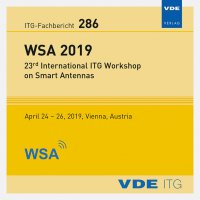Cooperative Localization by Set-theoretic Estimation
Conference: WSA 2019 - 23rd International ITG Workshop on Smart Antennas
04/24/2019 - 04/26/2019 at Vienna, Austria
Proceedings: WSA 2019
Pages: 8Language: englishTyp: PDF
Personal VDE Members are entitled to a 10% discount on this title
Authors:
Fink, Jochen; Schaeufele, Daniel; Kasparick, Martin; Cavalcante, Renato L.G.; Stanczak, Slawomir (Wireless Communications and Networks, Fraunhofer Heinrich Hertz Institute Berlin, Germany)
Abstract:
Among the vast variety of sensor localization techniques, set-theoretic estimation methods are especially appealing for large-scale networks with low-cost devices. Firstly, these methods usually exhibit comparatively low complexity. Secondly, the design of both centralized and distributed fixed-point algorithms for set-theoretic estimation problems is usually straightforward. Existing set-theoretic algorithms for range-based localization typically relax the spheric constraint sets to convex balls, which may lead to poor localization performance even if the range measurements are exact. In this paper, we formulate the spheric cooperative localization problem as a convex feasibility problem in a product Hilbert space. This formulation makes cooperative localization accessible by a multiplicity of simple iterative algorithms. In particular, we propose a cooperative localization technique that exploits the bounded perturbation resilience of a fixed-point algorithm for the spheric convex feasibility problem. We define perturbations that steer the iterates of the proposed algorithm towards a solution to a semidefinite relaxation of the problem. Moreover, we show that the localization accuracy can be improved with low effort by heterogeneous sensor measurements.


